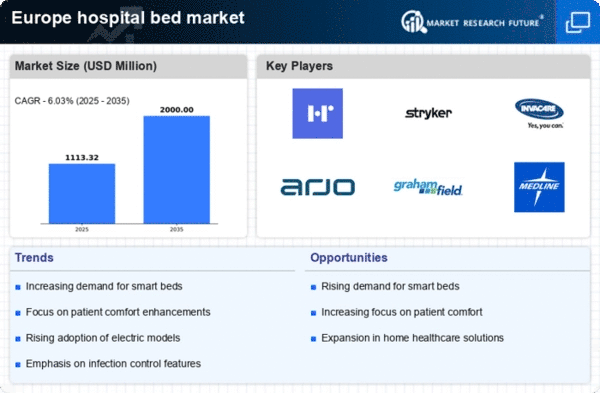Market Share
Europe Hospital Bed Market Share Analysis
The Europe, Middle East, and Africa (EMEA) hospital bed market is a dynamic landscape characterized by diverse healthcare structures and economic situations throughout the location. Understanding the market's nuances is important for effective market share positioning. EMEA consists of numerous countries with distinct healthcare wishes. European international locations regularly demand advanced and high-tech hospital beds, and at the same time, the Middle East and Africa can also prioritize value-effective solutions. Companies should tailor their strategies to fulfill the unique necessities of each sub-region. Successful market positioning includes continuous product innovation. Companies need to invest in research and improvement to introduce hospital beds that align with the evolving healthcare traits and policies in EMEA. Features like smart era integration, patient comfort, and clean renovation may be extensive differentiators. The healthcare industry in EMEA has difficulty with various regulatory frameworks. Adhering to those rules is essential for market reputation. Companies have to prioritize acquiring important certifications and approvals to instill self-belief in healthcare vendors and stop-users. Given the financial diversity in EMEA, presenting various fee-powerful answers may be a strategic flow. This permits organizations to cater to the budget constraints of healthcare centers in certain regions while retaining competitiveness in greater affluent markets. Conducting thorough market research is critical for knowledge of the specific desires and choices of every United States of America within EMEA. Localization of advertising and income strategies can decorate market penetration by addressing cultural and language variations efficiently. By forming strategic partnerships with nearby distributors, healthcare establishments, or government, our bodies can facilitate better market right of entry. Such alliances help navigate the intricacies of regional markets, ensuring greater seamless access and sustained increase. Providing robust after-income help is a key component in organizing a robust market presence. Timely protection services, education for healthcare personnel, and with no trouble to be had, spare elements contribute to constructing trust among clients, leading to brand loyalty. EMEA reports consistent changes in healthcare guidelines and practices. Companies should stay adaptable to rising tendencies, along with the increasing focus on home healthcare answers or the developing importance of patient-focused care, to stay relevant and competitive within the market. Implementing aggressive pricing strategies is critical for market percentage positioning. Leveraging digital marketing channels and preserving a strong online presence is essential for reaching a huge audience across EMEA. A well-designed online platform can serve as a treasured device for disseminating product data, enticing customers, and accomplishing e-commerce transactions.










Leave a Comment